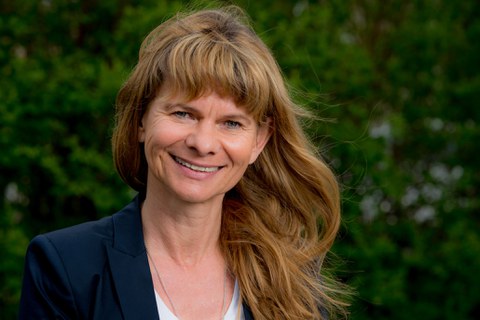Apr 14, 2025
The TUD Occupational Health Services - Interview with Dr. Astrid Friedmann-Ketzmerick
The TUD Occupational Health Services always keeps itself up to date and have repeatedly tackled new challenges and new services in the past. In an interview with the Head of the Occupational Health Services, Dr. Astrid Friedmann-Ketzmerick, we talk about the development of the Occupational Health Services, the wide range of services and upcoming events.
1. What are the current key issues, challenges and prospects for the Occupational Health Services?
The Occupational Health Services' main focus is first and foremost on fulfilling the statutory duties of TUD as an employer, including preventive occupational health care, organizing first aid at the university, and workplace inspections, as well as Occupational Re-integration Management (BEM).
Our University Health Management (UGM) currently finds itself in the midst of the busiest time of the year: On May 21, we are hosting the 13th Health Day for all staff and students of TUD, and a week later, on May 28, there will be the REWE Team Challenge, for which we are organizing the TUD team, which set a new record last year with 940 starters participating. At the same time, we launched the Health Passport for our students at the start of the 2025 summer semester, are advancing the Student Health Management project (SGM) and are active in the acquisition of third-party funding.
Last but not least, the Occupational Health Services will be moving to new premises on Nöthnitzer Straße this summer, and we are already working on the intranet, where we want to create a health portal for TUD staff and students.
2. Can you please name some important achievements of the Occupational Health Services since the establishment of Directorate University Culture?
On the one hand, the establishment of Directorate University Culture meant that the Occupational Health Services were better networked with stakeholders and areas that play an essential role in the cross-sectional field of health at TUD. These include Diversity Management with topics such as the family-friendly university, inclusion and accessibility, as well as the newly created Campus Life department, comprising our Green Office.
On the other hand, our reassignment to the Directorate University Culture was associated with an increase in personnel resources, allowing us to expand our area of responsibility and take on new projects. In this context, I would like to mention the Student Health Management (SGM), which we have been developing since 2021. In 2023, we succeeded in raising substantial funds from the Techniker Krankenkasse health insurance company for the SGM, which we are using to set up a structured health management system for all TUD students.
3. What is the Student Health Management? How does it fit into the University Health Management?
If we think of health at TUD as a house, then University Health Management (UGM) is the roof, so to speak. In addition to the statutory duties relating to occupational safety and health as well as BEM, it includes the promotion of the health of all our staff and students. This encompasses activities such as physical exercise, a healthy diet or mental health, as well as measures to promote healthy working and studying conditions.
Taking our students into focus, a key element of this endeavor is the Student Health Management (SGM) project “Health(y) TUDay - with you, for you!” It focuses on the needs, burdens and stresses of students. During the last few months, we analyzed the current situation of student health at TUD with all Faculty Student Bodies. In the next step, we will derive and implement suitable measures to promote healthy study conditions.
4. Who are your most important cooperation partners within and outside of TUD? Why are they essential to your work?
Health as a multi-faceted issue thrives on networking and collaboration. All partners who are committed to the health of our staff and students inside and outside TUD are extremely valuable.
In the field of occupational medicine, we cooperate closely with the units Occupational Safety and Radiation Protection, as well as with many other colleagues from Directorate 4. When it comes to organizing first-aid courses, the Maltese and the Saxony Accident Insurance are essential partners. The most important stakeholders for the BEM include the Personnel Representation Council, the Representative of Employees with Disabilities, the Inclusion Officers, Directorate 2, and the supervisors of the respective BEM beneficiaries.
For the University Health Management, the list is even longer. Here, our major partners include large parts of the university administration, the DHSZ, the HTW, the SLUB, the Student Union (Studentenwerk) Dresden, the University Hospital Dresden, numerous committed researchers from TUD and, of course, the University Executive Board. Additionally, there are the various health insurance companies that have been providing us with extensive support for years, networks and interest groups, other universities with which we regularly exchange experiences, and many, many more.
5. Please give us an insight into this year's events. What can the TUD community look forward to in 2025 when it comes to Occupational Health Management?
As already mentioned, the Health Day will take place on May 21 and the REWE Team Challenge will be held a week later, on May 28. I would like to warmly invite all staff and students to both of these events.
In June, we will hold a forum on “Mental well-being on campus,” both in German and English. In addition, we will be represented at a number of events during the year, such as open day, the DHSZ sports festival, and the welcome ceremony.
What's more, at many of these events, our students can get a stamp in their Health Passport.

